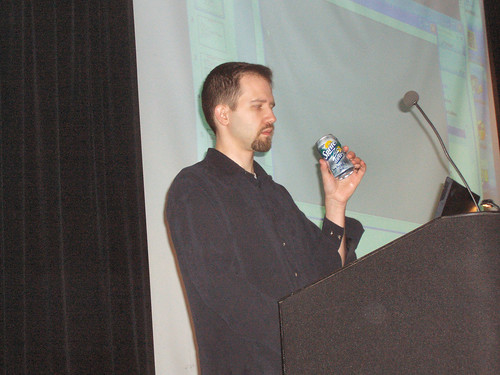Questions my AIM Presentation Last Week:
A big thanks to Stephen Collins of acidlabs for his detailed response. As an expert who speaks to senior decision makers daily on Web 2.0 and social-networking, he’s an excellent resource.
1. Susan asks: Does Microsoft have a Corporate Blogging Policy?
For me, it’s encompassed in this simple phrase: “Don’t be Stupid“
However, the more formal policy is embodied in some more formal bullet points:
- Above all, “Be smart.â€
- Respect existing confidentiality agreements
- Don’t break news; don’t disclose confidential information
- Be cautious with third-party information
- Respect prior employers
- Identify yourself
- Be cautious in how you offer support or advice
- Speak for yourself
- Think about reactions before you post
This Wired article on Jeff Sandquist, the quiet uber-boss of Microsoft’s community sites provides another perspective from an independent point of view.
2. Susan asks: what about visibility of your history as an Employee?
Question from employer’s perspective is that they already have the ability to openly vet potential employees: references, word-of-mouth. Many of the questions are related to whether a potential employee will fit into the organisation’s culture.
From an employee’s perspective: I cannot stress enough that you must own your own digital identity. It’s better to call out what might be out there, and explain your perspective. Thankfully, Australia has strong Equal Opportunity laws that protect employees.
Another question I would ask is was is the fact that “it” was done, or that its is suddenly searchable that makes you uncomfortable? Much more of a moral question, I suppose.
Where you draw the line? It depends on the individual. Blogging and participating as an individual just for work purposes is appropriate. Locking down your pictures and other personal information for your own family and friends and separating your identities is also appropriate. Noone should ever be forced to write to the web against their own personal values.
The final point I would make is that the internet is a public place.
3. Question From Phil: Thanks for a very informative presentation. I was interested in a somewhat “off the cuff” comment you made about your title being made “professional geek” after some debate with your employer, Microsoft. Do you want to elaborate on the discussion you had about this and whether it caused any consternation? It strikes me as interesting if it was hard to convince people that a title like this might fit on an org chart in the brave new web world!
This post has the evidence. A proud moment when the cards arrived, and my former boss Frank Arrigo changing the HR system.
OK, the story.
My official title is Enthusiast Evangelist. I love what I do, but this title is too marketing-title for me. I do work in the Evangelism team.
On my fourth day at Microsoft, the global team met Rory: a http://channel9.msdn.com/ host and a character. His central theme is “create a persona”
I decided my persona is myself. Be a geek. Be an accessible geek for those who are enthusiastic about technology. A Professional. Hence Professional Geek.
So, next step: ask for the business cards. Title: Professional Geek.
The internal order was quickly rejected by Purchasing. Why? All titles printed on cards needed to be reflected in our HR system. After 3 weeks of backwards and forward email (low priority in my list of things to do) – Frank found a work-around. All it needed was an email from him “OK-ing” the non-standard title, and all is OK. I also remember sending an email to Microsoft HR asking for a title change. To no avail. Being in Frank Arrigo’s team at the time, I think they expected some iconoclastic requests.
Later in the year, Frank found he could freely change titles in the HR system.
The univseral response of people when they see “Professional Geek” is one of glee. I starts a conversation, and truly reflects what I am, do and stand for.
Microsoft is so cool to permit this.
So, how do you get this through your organisation?
Really, its about what you do for your organisation and what that represents to the outside world. Enthusiast Evangelist was too inward looking.
4. Freedom of expression. Does the blogging influence what I write?
Yes, it does influence what I write, record and publish. I am an employee of Microsoft; but context is also important.
For instance, there are personal entries on my blog – and entries from when I was not an employee of Microsoft. The reality of Maslow’s Hierarchy of Needs drives us all; and this will influence what and how I write.
In March 2007, Munir Kotadia on ZDNet blogged how a Mac user’s cat had broken MacOS X security. Now I am a sucker for cat stories. And as a Mac user, I had seen our cats sleeping on our PC and Mac laptops around the house. Where there is warmth, there is cat.
My mistake was blogging a reference to this article on http://on10.net/ with a picture of one of my cats. This blog entry was pulled within a few hours. It was a stupid, rush-of-blood to the head post that added to value to the world.
How many rules I break above? About 4 or 5.
The cardinal rule is sensitivity to security as an issue. I wasn’t thinking, and was stupid.
Thankfully, Microsoft permits mistakes. And admission of mistakes. Learnt my lesson, built a bridge and I am getting over it.
I still think the story is cute, and in retrospect it deserved at least a LOLcat.




